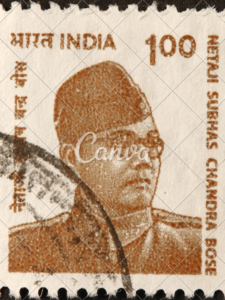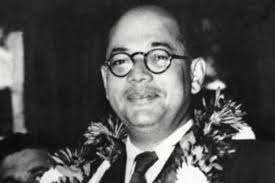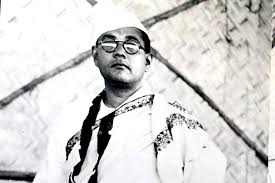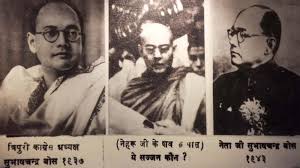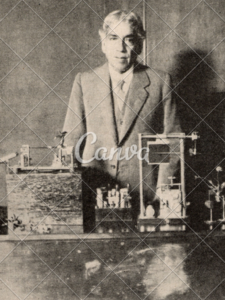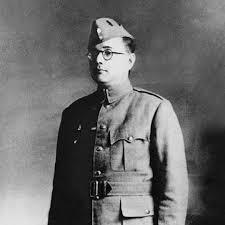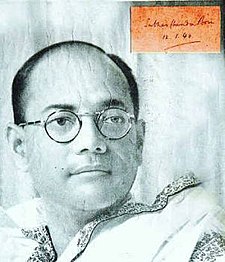Indian nationalist leader Subhas Chandra Bose was born on January 23, 1897, and he died on August 18, 1945. He was a key figure in the nation’s struggle for freedom from British colonial rule. The world knows Netaji, whose name means “Respected Leader” in Hindi, for implementing a cutting-edge strategy to ensure India’s independence.
Born in Cuttack, Odisha, India, Bose had his schooling in England and Calcutta, or Kolkata. He was lured to the Indian National Congress (INC) from the start due of its emphasis on nationalism and freedom.
But Bose’s strategy for winning India’s independence was different from Mahatma Gandhi’s. He was not content with merely being autonomous inside the British Commonwealth; instead. He argued for complete self-rule and supported a more assertive and direct strategy. Bose’s disagreements with Gandhi’s theory of nonviolent resistance and the Congress leadership ultimately led to his resignation from the organization.
In order to create the Indian National Army (INA), Bose worked with the Axis nations—Japan being the main one—to take advantage of the British weakened position during World War II. The Indian National Army’s (INA) goal was to use force to free India from British domination. Bose attracted considerable attention by attempting to persuade Indian prisoners of war to fight alongside the Japanese against the British. However, the majority of the INA’s military efforts were unsuccessful.
Various conspiracy theories have evolved in the aftermath of Bose’s strange disappearance in 1945. His death is believed to have occurred in a plane crash in Taiwan on August 18, 1945. However there are speculations indicating he might have survived and lived in secret.
In India, feelings of Subhas Chandra Bose’s legacy are nuanced and varied. While there is no debate about his unwavering support for India’s independence, there is some question about his cooperation with Axis troops during World War II. Some hail him as a hero for daring to defy British authorities, while others accuse him of supporting fascist forces. He is a symbol of unwavering perseverance and an important character in India’s liberation struggle.
Subhash Chandra Bose Education:
Subhash Chandra Bose played a pivotal role in the education sector without even formally emphasizing it. His vision for India’s independence and his dedication to the cause inspired numerous educational initiatives. Bose believed that education was critical for individuals’ overall growth and empowerment, which would contribute to the nation’s progress.
Through his leadership and advocacy, he encouraged the establishment of schools, colleges, and educational institutions aimed at nurturing a generation of enlightened citizens capable of leading India towards self-reliance and prosperity. Bose’s emphasis on self-discipline, resilience, and critical thinking resonated deeply with his educational philosophy, influencing educators and students alike.
Furthermore, his emphasis on indigenous education and Indian language promotion demonstrated his devotion to cultural rebirth and national identity. Despite the challenges posed by the British colonial regime, Bose’s unwavering dedication to the educational upliftment of his countrymen left an indelible mark on India’s educational landscape. Laying the foundation for a more inclusive and empowering system of education in the post-independence era.
Stewart High School, Cuttack:
I apologize for any confusion, but as of my last knowledge update in January 2022. I do not have specific information about Subhash Chandrabose Stewart High School in Cuttack. It is likely that the school is a local or newly created institution, with few details available.
For accurate and up-to-date information about Subhash Chandrabose Stewart High School in Cuttack, I recommend checking local educational authorities. School directories, or contacting the school directly if there is an official website or contact information available. This can assist you in getting the most accurate and up-to-date information on the school’s background and other pertinent factors.
Ravenshaw Collegiate School, Cuttack:
As of January 2022, I did not have any detailed information regarding Subhaschhandra Bose Ravenshaw Collegiate School in Cuttack. If this is a newly created school or there were shifts since my last post. For the most up-to-date information, go to the school’s website, call the school directly, or speak with local school officials.
The school bears the famous Indian national leader’s name as a possible homage to Subhas Chandra Bose’s legacy. School names often reflect the values and ideals they seek to instill in their students, and in this case, it could indicate a focus on patriotism, leadership, and commitment to public service. The best source of information on the school, including its history, mission, and programs, would be to contact its leadership.
Cambridge University, England:
Notably involved in India’s independence movement, Subhas Chandra Bose did not attend Cambridge University in England. Rather, he continued his studies at Cambridge University in England. Bose went on to complete the Indian Civil Service examination in 1920, but his strong sense of patriotism and desire for India’s freedom led him to resign from the civil service. Subhas Chandra Bose played a crucial role in the Indian Nationalist Movement, advocating for complete independence from British rule. His commitment to the cause eventually led him to form the Indian National Army (INA) during World War II, with the aim of liberating India. Although Bose’s connection to Cambridge University is not accurate, his contributions to India’s struggle for independence remain a significant part of the country’s history.
Indian Civil Service (ICS) Examination:
Bose expressed early interest in a career in the British public service during his 1920 Indian Public Service (ICS) exam. The 1897-born Bose excelled academically and showed an early interest in patriotic ideas. Though he was successful in passing the ICS exam, his strong belief in India’s independence caused him to resign from the prestigious administrative post in 1921.
Bose’s decision to resign from the Indian Civil Service underscored his commitment to the cause of India’s freedom. He chose to participate in the political fight under British colonialism, aligning himself with leaders who advocated for complete independence. Bose’s subsequent involvement in the Indian Nationalist Movement and his formation of the Forward Bloc and later the Indian National Army (INA) demonstrated his fervent dedication to the pursuit of India’s sovereignty.
Subhas Chandra Bose left the Indian Civil Service after serving for a short period of time. This decision highlights the internal struggle many Indian intellectuals at the time faced in deciding whether to endorse the British colonial regime or to become involved in the larger freedom movement.
Further Studies:
Bose, a key figure in India’s freedom war, was well-known for his passion, charisma, and commitment to the cause. Bose completed his studies in England after graduating from Calcutta’s Presidency College with a bachelor’s degree in hand. Fitzwilliam College, Cambridge University, was his place of study after he passed the Civil Service examination.
Bose had problems with an official career, and his desire for India’s independence drove him to pursue a different route. He resigned from the prestigious Indian Civil Service in 1921 and returned to India, where he became actively involved in the freedom movement. Bose rose through the ranks of the Indian National Congress, but his differences with the leadership’s approach, particularly Mahatma Gandhi’s non-violent methods, eventually led him to part ways with the Congress.
In order to gain independence, Subhas Chandra Bose advocated for more forceful and direct action. In 1942, he took a risky step by requesting help from the Axis powers to liberate India from British rule. He established the Indian National Army (INA) with Japanese assistance in order to liberate India. The INA’s role during the war, however, did not lead to immediate independence, but it had a significant impact on the political landscape.
Bose’s mysterious death in a plane crash in 1945 has fueled various theories and speculations. Despite the controversies surrounding his demise, Subhas Chandra Bose’s legacy as a nationalist leader and freedom fighter remains a source of inspiration for many in India. His contributions to the independence movement and his unwavering commitment to the cause have left an indelible mark on the history of the country.
Nationalist Activities:
Subhash Chandra Bose played a pivotal role in India’s nationalist movement through his unwavering dedication and revolutionary zeal. Bose, born in 1897, was greatly affected by nationalist and libertarian principles from an early age. He joined the Indian National Congress (INC) in the early 1920s and quickly rose through its ranks due to his charisma and leadership skills. However, his differences with the more moderate leaders of the Congress led him to form the Forward Bloc in 1939. Advocating for complete independence from British rule through any means necessary.
Bose’s nationalist activities took various forms, marked by his willingness to challenge British authority and inspire the masses. He famously coined the slogan “Give me blood, and I shall give you freedom,” reflecting his willingness to sacrifice everything for India’s independence. His advocacy for armed resistance against the British attracted many followers, especially during World War II. When he sought support from Axis powers such as Nazi Germany and Imperial Japan to overthrow British rule.
Bose’s most notable nationalist activity was his formation of the Indian National Army (INA) in 1942, with the aim of liberating India from British control. Comprising primarily of Indian prisoners of war captured by the Japanese in Southeast Asia, the INA fought alongside Japanese forces in Burma. Although the INA’s military campaigns ultimately did not succeed in achieving their objective. They symbolized a powerful assertion of Indian nationalism and inspired countless Indians to continue the struggle for independence.
Despite his controversial alliances and methods, Subhash Chandra Bose remains a revered figure in Indian history for his unwavering commitment to the cause of freedom. His nationalist activities continue to inspire generations of Indians to fight against oppression and injustice. Embodying the spirit of resistance and determination in the quest for independence.
Resignation:
A prominent Indian nationalist leader, made a significant impact on the fight for India’s independence from British rule. Bose served as the President of the Indian National Congress in 1938 and 1939 but later resigned due to ideological differences with other leaders within the party, particularly regarding the approach to achieving independence.
Bose believed in taking a more radical and assertive stance, advocating for direct action to achieve immediate independence, even if it meant collaborating with Axis powers during World War II. Congress, on the other hand, took a more circumspect and diplomatic stance and did not agree with him. Due to these conflicting viewpoints, Bose submitted his resignation in April 1939.
Bose stated in his letter of resignation that bold action and a united front were necessary to ensure India’s freedom. Despite stepping down from the Congress presidency, Bose continued his efforts to contribute to the independence movement. Eventually, he formed the Forward Bloc in 1939, an organization that sought to gather like-minded individuals willing to adopt a more militant approach to gain freedom.
Subhas Chandra Bose’s resignation from the Indian National Congress marked a pivotal moment in India’s struggle for independence. Reflecting the ideological and strategic divisions within the nationalist movement during a crucial period in history.
Political Involvement:
Subhash Chandra Bose was a prominent figure in India’s struggle for independence against British colonial rule. His political involvement was marked by fierce determination and a commitment to achieving freedom through any means necessary. Bose vigorously defended a more aggressive and militant posture against the British and openly criticized Mahatma Gandhi’s nonviolent strategy.
He rose to prominence within the Indian National Congress but eventually parted ways due to ideological differences. Bose believed that direct action was necessary to achieve independence and founded the Forward Bloc, a party dedicated to military struggle for India’s liberation.
Bose’s political involvement extended beyond India’s borders as he sought support from various international powers, including Nazi Germany and Imperial Japan, during World War II. He believed that aligning with these nations would help weaken the British and hasten India’s independence.
Despite facing numerous challenges and controversies, including his mysterious disappearance in 1945, Subhash Chandra Bose remains a revered figure in Indian history. His unwavering dedication to the cause of independence and his willingness to challenge conventional methods of political struggle continue to inspire generations of Indians.
Indian National Congress:
British India’s political climate in the first half of the 20th century was greatly influenced by the actions of one of the movement’s leading figures, Subhash Chandrabose. Who was born on January 23, 1897, joined the Indian National Congress (INC) in the early 1920s after being greatly inspired by Mahatma Gandhi’s principles.
Bose’s contributions to the INC were marked by his dynamic leadership and commitment to achieving complete independence for India. He was selected to serve as the INC president in 1938 and 1939. However, ideological differences with the dominant faction led by Mahatma Gandhi and Jawaharlal Nehru eventually led to his resignation in 1939.
Bose, unwilling to compromise with the British, sought Axis backing during World War II to liberate India from colonial oppression. In 1939, he created the Forward Bloc to represent those who disagreed with the Congress leadership’s cautious posture. His collaboration with the Axis powers, especially Nazi Germany and Imperial Japan, to form the Indian National Army (INA) aimed to liberate India by force.
Questions and speculation abound over Bose’s mysterious 1945 disappearance. Though the cause of his death remains unclear, Bose’s legacy endures as evidence of his unwavering dedication and unflinching resolve in the struggle for India’s independence. Bose’s membership in the Indian National Congress, which was founded in 1885, demonstrates the diversity of ideologies that were prevalent in the broader independence movement. In the freedom war, the party played a crucial role.
Disappearance:
The disappearance of Subhas Chandra Bose, a prominent leader in the Indian independence movement, remains shrouded in mystery and controversy. Popularly known as Netaji, Bose played a key role in India’s struggle for freedom against British colonial rule. However, in 1941, during World War II, Bose sought international support to free India from British control and established the Indian National Army (INA) with the help of Axis powers, including Nazi Germany and Imperial Japan.
In 1945, as the war approached its end, Bose’s fate took a mysterious turn. He was reported to have died in a plane crash in Taipei, Taiwan, on August 18, 1945. However, the circumstances surrounding his death have been questioned, and various conspiracy theories have emerged. Some people think that Bose survived the alleged crash and lived covertly in several locations across the globe. While others speculate that he was captured and imprisoned.
The official version, supported by the findings of various inquiries, maintains that Bose died in the crash. However, due to the lack of concrete evidence and the secretive nature of Bose’s activities, the mystery surrounding his disappearance persists. The Indian government declassified some files related to Bose in recent years, but many questions remain unanswered, adding to the intrigue and speculation surrounding the final days of this iconic leader. The enigma of Subhas Chandra Bose’s disappearance continues to be a subject of historical debate and research.
Escape to Germany:
The narrative of Subhas Chandra Bose’s WWII flight to Germany is a fascinating one in the annals of India’s independence movement. In 1941, Bose, who was discontent with the approach of the Indian National Congress towards achieving independence, sought help from Axis powers to free India from British rule. With the help of German and Japanese authorities. Bose embarked on a perilous journey from India, eventually reaching Germany in 1941.
In Germany, Bose established contact with high-ranking Nazi officials and sought their assistance in forming an Indian army to fight alongside the Axis powers against the British. He believed that the enemy of his enemy could be a potential ally for India’s liberation. Bose’s efforts culminated in the formation of the Indian Legion, also known as the Azad Hind Fauj, comprising Indian prisoners of war and expatriates in Europe.
When Bose visited Adolf Hitler in Germany, he requested his support for India’s cause. Bose’s cooperation with the Axis powers, which entailed siding with the troops in charge of many atrocities committed during the war, is still a contentious part of his legacy.
In 1943, Bose left Germany and traveled to Southeast Asia, where he continued his efforts to build support for the Indian National Army (INA). Despite the complexities and controversies surrounding Bose’s alliance with Axis powers, his actions reflected his unwavering commitment to achieving India’s independence through any means necessary.
Subhash Chandra Bose Indian National Army (INA):
The Indian National Army (INA) was formed during World War II with significant assistance from Subhas Chandra Bose, a well-known figure in the Indian independence struggle. India was under British colonial control when Bose, a dynamic and driven leader, was born in 1897.
Bose initially rose to prominence within the Indian National Congress but later grew disillusioned with its non-violent approach. He believed that forceful measures were necessary to achieve India’s independence. During the early years of World War II, Bose saw an opportunity to capitalize on the geopolitical situation. In order to assist in releasing India from British dominion. He looked to Axis nations like Nazi Germany and Imperial Japan for cooperation.
In 1942, Bose formed the Azad Hind Fauj (Indian National Army) with the support of the Japanese. The INA aimed to recruit Indian prisoners of war and civilians to fight alongside the Axis powers against the British in Southeast Asia. Bose famously addressed the soldiers of the INA with the slogan “Dilli Chalo” (On to Delhi), expressing the goal of capturing the Indian capital.
The INA participated in military campaigns in Burma (present-day Myanmar) and Northeast India. Despite facing logistical and strategic challenges, the INA achieved some initial successes. However, as the tide of the war turned against the Axis powers, the INA’s prospects diminished.
With the end of World War II in 1945, Bose’s fate became a subject of speculation. His death in a plane crash in 1945 remains a topic of controversy and mystery. Regardless, Subhas Chandra Bose and the Indian National Army left a lasting impact on India’s struggle for independence. Symbolizing the spirit of resistance and determination in the face of colonial oppression. The INA’s legacy is celebrated in India as a significant chapter in the country’s fight for freedom.
Subhash Chandra Bose Contributions to Independence Movement:
Subhash Chandra Bose played a pivotal role in India’s struggle for independence through his relentless efforts and unyielding determination. He envisioned a free India and dedicated his life to achieving this goal. Bose’s contributions to the independence movement were multifaceted and far-reaching. He advocated for complete independence from British rule and was a vocal critic of the moderate approach of the Indian National Congress.
Bose’s leadership and organizational skills were evident in his role as the President of the Indian National Congress in 1938 and 1939. During his tenure, he emphasized the need for mass mobilization and direct action against British imperialism. He championed the cause of the marginalized and oppressed sections of society, advocating for their rights within the framework of a free India.
One of Bose’s most significant contributions was the formation of the Indian National Army (INA) in 1942. Recognizing the strategic importance of military action, Bose collaborated with the Axis powers during World War II to garner support for India’s independence struggle. The INA, comprising Indian prisoners of war and civilians, fought alongside the Japanese forces in Burma with the slogan “Chalo Delhi” (Onward to Delhi). Despite facing numerous challenges, including logistical difficulties and internal dissent, the INA symbolized the spirit of resistance against colonial rule.
Bose’s unwavering commitment to the cause of freedom inspired millions of Indians to join the struggle for independence. His charisma, courage, and willingness to sacrifice made him a revered figure in Indian history. Even after his mysterious disappearance in 1945, Bose’s legacy continued to inspire generations of Indians to strive for a free and sovereign nation. Today, he is remembered as one of the towering figures of India’s independence movement, whose contributions continue to resonate in the collective consciousness of the nation.
Subhash Chandra Bose Legacy:
Subhash Chandra Bose left an indelible mark on the legacy of India’s struggle for independence. His unwavering dedication, fearless leadership, and radical approach to achieving freedom made him a revered figure in Indian history. Bose’s legacy is defined by his relentless pursuit of independence, even if it meant aligning with ideologies that were unconventional at the time.
One of the most significant aspects of Bose’s legacy is his role in establishing the Indian National Army (INA) during World War II. He believed that armed resistance was necessary to overthrow British colonial rule in India, and he saw the opportunity in collaborating with Axis powers like Nazi Germany and Imperial Japan to achieve this goal. Despite facing criticism for this controversial alliance, Bose’s determination to challenge British authority through military means inspired thousands of Indians to join the INA.
Bose’s leadership and charisma elevated the INA to a powerful force, fostering pride and nationalism in its men. The famous slogan “Jai Hind” became synonymous with the INA and reflected Bose’s vision of a liberated India. His military campaigns in Southeast Asia, particularly the Burma Campaign, showcased his strategic acumen and further bolstered the morale of Indian nationalists.
Although Bose’s efforts during World War II did not directly lead to India’s independence, they significantly contributed to the momentum of the freedom movement. His legacy continues to inspire generations of Indians who admire his unyielding spirit and commitment to the cause of liberation. Even today, Subhash Chandra Bose remains a symbol of courage, defiance, and the relentless pursuit of freedom in the annals of Indian history.
Influence:
Because of their admiration for Subhas Chandra Bose’s dedication and tenacity in the struggle for freedom, Indians of all ages find inspiration in his legacy. The significance of his focus on independence, patriotism, and sacrifice remains in the collective memory of India’s independence fight.
His memory is observed on January 23, also known as “Netaji Subhas Chandra Jayanti” in India, Subhas Chandra Bose’s birthday. There has also been a great deal of historical inquiry, discussion, and argument about his life and contributions.
Differences with Gandhi:
Subhash Chandra Bose and Mahatma Gandhi, two prominent figures in India’s struggle for independence, had significant differences in their approaches and ideologies. While both aimed for the same goal of liberating India from British rule, their methods and perspectives often diverged.
Bose, a fervent nationalist and charismatic leader, believed in more assertive and radical measures to achieve independence. He advocated for direct action and was willing to align with any force that could help expedite India’s liberation, even if it meant collaborating with Axis powers during World War II. Bose’s approach was marked by his belief in armed struggle and his commitment to establishing a strong, centralized leadership.
On the other hand, Gandhi, known for his philosophy of nonviolence (ahimsa) and civil disobedience, emphasized moral and ethical principles in the fight against colonialism. He believed in winning independence through peaceful protests, boycotts, and mass movements, emphasizing the importance of individual and collective self-discipline.
One of the key differences between Bose and Gandhi was their stance on collaboration with the British. While Gandhi sought to negotiate with the British and persuade them through nonviolent means, Bose saw them as adversaries to be confronted and defeated through more forceful methods.
Additionally, their visions for post-independence India differed. Bose leaned towards a more centralized and structured form of governance, while Gandhi advocated for decentralized, village-based self-sufficiency and democratic principles.
Despite their differences, both Bose and Gandhi shared a deep commitment to India’s freedom and worked tirelessly towards that end, albeit through contrasting strategies. Their divergent approaches reflect the complexity of the independence movement and the varied ideologies that shaped it.
Subhash Chandra Bose Leadership of the INC:
Subhas Chandra Bose’s leadership within the Indian National Congress (INC) was marked by his dynamic and assertive approach during a critical period in India’s struggle for independence. Bose served as President of the INC in 1938 and 1939, bringing his own particular leadership style to the position.
Unlike some of his contemporaries within the Congress who adhered to Mahatma Gandhi’s philosophy of non-violence, Bose believed in a more direct and forceful strategy to achieve independence. This led to differences with the Gandhian faction within the Congress. Bose’s stint as INC president was distinguished by his efforts to achieve complete independence and his demand for widespread mobilization.
Bose’s leadership style was characterized by his ability to connect with the masses and galvanize support for the cause. He was an effective orator and a charismatic leader, capable of inspiring people to actively participate in the freedom struggle. His emphasis on discipline and organization was reflected in his efforts to build a strong and unified Congress party.
However, differences in approach, especially regarding the use of force, eventually led to a split within the Congress. Bose resigned from the presidency in 1939, as he felt that he did not have the full support of the Congress Working Committee, which was more aligned with Gandhi’s non-violent philosophy.
Despite the differences and the eventual split, Subhas Chandra Bose remained an important figure in India’s war for independence. He went on to form the Forward Bloc, a political group advocating for radical and immediate steps toward achieving independence. Bose’s leadership within the INC, though relatively short-lived, left an indelible mark on the trajectory of the freedom movement, showcasing the diversity of ideologies within the larger struggle for India’s independence.
Subhash Chandra Bose Role in World War II:
During World War II, Subhash Chandra Bose made a substantial contribution to India’s fight for freedom from British colonial authority. Bose, a prominent Indian nationalist leader, believed in the necessity of armed struggle to achieve India’s freedom. He famously formed the Indian National Army (INA) in 1942, with the support of Imperial Japan and Nazi Germany. Bose intended to use the INA as a weapon to fight the British in Southeast Asia with the Axis powers.
Bose’s collaboration with Axis powers stemmed from his pragmatic approach toward achieving Indian independence. Despite ideological differences, he saw an opportunity to exploit the geopolitical situation of the time to weaken British colonial control. Under Bose’s leadership, the INA recruited Indian prisoners of war and civilians living in Southeast Asia to join its ranks. The INA’s motto, “Ittehad, Itmad, Qurbani” (Unity, Faith, Sacrifice), resonated with many Indians who sought liberation from British rule.
Bose’s alliance with Axis powers, however, remains controversial. While he sought support wherever he could find it to achieve his goals, his association with authoritarian regimes like Imperial Japan and Nazi Germany raised ethical concerns. Despite this, Bose’s efforts inspired thousands of Indians to join the struggle for independence. The INA’s campaigns, notably the Burma Campaign, marked a significant chapter in India’s fight for freedom.
Ultimately, Bose’s contributions to the Indian independence movement cannot be overlooked. His leadership of the INA and his efforts to rally support for India’s cause on the international stage significantly influenced the course of India’s struggle for independence. Even though his alliance with Axis powers remains contentious. Bose’s unwavering commitment to the goal of liberating India from colonial rule solidified his legacy as one of the most iconic figures in India’s fight for freedom.
Involvement in the Indian Nationalist Movement:
Bose played a pivotal role in the Indian nationalist movement, particularly during the struggle for independence against British colonial rule. Born in 1897, Bose emerged as a dynamic leader with a fervent commitment to achieving freedom for India. He was deeply influenced by the principles of nationalism and the teachings of Swami Vivekananda, which instilled in him a sense of pride in Indian culture and heritage.
Bose’s involvement in the Indian National Congress (INC) began in the early 1920s, where he quickly rose through the ranks due to his charismatic leadership and strong advocacy for complete independence from British rule. However, his approach often clashed with the more moderate stance of Congress leaders like Mahatma Gandhi. Bose believed in more forceful and militant ways toward independence, which led to his departure from the INC in 1939.
Forming the Forward Bloc, Bose continued his fight against British colonialism, advocating for armed resistance if necessary. His renowned catchphrase, “Give me blood, and I shall give you freedom,” symbolizes his unrelenting commitment to the cause. Seeking support for the Indian cause, Bose traveled extensively, even seeking alliances with Axis powers during World War II. His leadership and vision earned him admiration and support from many Indians, especially those disillusioned with the slow progress of the non-violent movement led by Gandhi.
Bose’s mysterious disappearance in 1945, following the end of the war, remains a subject of debate and speculation. However, his legacy as a fearless nationalist leader and his contributions to the Indian independence movement continue to inspire generations of Indians in their pursuit of freedom and justice.
Subhash Chandra Bose Netaji’s Call to Freedom:
Chandrabose, affectionately known as Netaji, was a charismatic and influential leader in the Indian independence movement against British colonial rule. His call to freedom resonated with the fervor and determination that characterized his approach to achieving India’s liberation.
Netaji Bose firmly believed in the principle of direct action to achieve political goals. In one of his famous speeches, he passionately called upon the Indian masses to rise against the British Raj and actively participate in the struggle for independence. His words were not just a call to arms but a powerful appeal for unity and a shared vision of a free and sovereign India.
Netaji’s vision extended beyond mere political freedom; he sought to establish a social order based on justice and equality. His call to freedom was not limited to breaking the chains of colonialism but also aimed at creating a society where every individual could live with dignity and self-respect.
Throughout his leadership, Netaji emphasized the need for self-reliance and self-governance. He envisioned a free India that would determine its destiny without external interference. His rallying cry encouraged people to overcome their fears, unite across religious and cultural divides, and strive collectively for the common goal of independence.
Netaji’s cry to freedom was more than simply a slogan; it motivated countless others to join the war for independence. His legacy continues to inspire generations, reminding us of the indomitable spirit and sacrifice required to achieve and preserve freedom. Subhash Chandra Bose’s words and efforts will be remembered as a testament to the never-ending pursuit of liberty and justice.
Subhash Chandra Bose Death:
Renowned Indian independence activist Subhas Chandra Bose met an enigmatic death that has sparked conjecture and debate for many years. Bose’s death, shrouded in mystery and intrigue, occurred under circumstances that remain disputed and unclear.
Bose died in 1945 after working with the Axis powers during WWII, adding to the mystery surrounding his final days. While the official narrative claims he perished in a plane crash in Taiwan on August 18, 1945, several explanations disagree. Some believe that he survived the crash and lived under an assumed identity, while others speculate that he was captured and killed by the Soviet Union.
The lack of conclusive evidence and conflicting accounts have only deepened the mystery surrounding Bose’s death. Despite numerous investigations and inquiries, no definitive answer has emerged, leaving his ultimate fate open to speculation and debate. Bose’s death remains one of the greatest mysteries of contemporary Indian history, and his memory has inspired generations of Indians.

